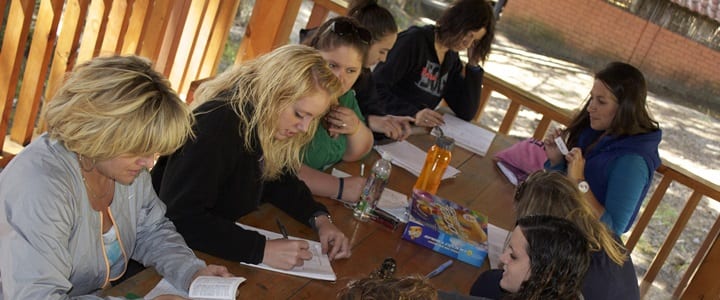 Want to learn a new language? If you took a Spanish class in high school or college, you may have faint memories of simple vocabulary words and Día de los Muertos parties. But Spanish can be much more than just a language elective in school. Read on as Carmichael, CA Spanish tutor Joan B. explains…
Want to learn a new language? If you took a Spanish class in high school or college, you may have faint memories of simple vocabulary words and Día de los Muertos parties. But Spanish can be much more than just a language elective in school. Read on as Carmichael, CA Spanish tutor Joan B. explains…
Spanish teachers relish the times when their students have “aha” moments; seeing students putting together all of the grammar, vocabulary, and colloquial understanding of the language to speak easily is one of the best parts of teaching the Spanish language. How do Spanish teachers do it? It can be challenging at times to teach the student at a level that is both comfortable and challenging for the student; to make sure that the student is meeting all of the benchmarks for language acquisition; and to keep it fun and engaging all the time.
Read on to discover five things your teacher never told you in Spanish class, but that will greatly help you in your journey of learning Spanish now.
1. Your teacher is still learning, too! Most Spanish teachers decide to teach Spanish because they have a strong passion for exploring the intricacies of the language and sharing it with others. This means that regardless of whether your teacher is a native speaker or learned Spanish just as you are currently learning it, he or she is still learning new ways of expressing things and current slang and trends in the language. It’s likely your Spanish teacher also engages in regular interaction in the language, speaking to other Spanish speakers in a variety of contexts.
You can benefit from this knowledge that your teacher is learning alongside you because it can inspire you to view Spanish language acquisition as an enjoyable and enriching lifelong journey. The more you learn, the more you are exposed to the richness and depth of a language that offers conversational, travel, and literary explorations. You can also engage in using Spanish just as your teacher does: on the phone with a Spanish speaker, in line when you hear someone who is a Spanish-only speaker, while traveling, and much more! The possibilities for practice are only limited by your willingness to explore and expose yourself to new contexts.
2. Language learning is a team effort. If you view learning Spanish as a collaboration between you and your teacher, you will progress much more quickly. While teachers do a great deal of work to explain the concepts of the language to you, without your active participation, they are limited in their ability to help you. By listening carefully to his or her suggestions, and providing frequent feedback as to what you find confusing or challenging, your teacher can tailor the lessons more specifically to target areas that are most difficult to you. Viewing it as a collaboration also makes you a more responsible and active learner, meaning that you can explore on your own, look ahead to new material and come back to your next session with lots of questions, which leads me to the next thing your Spanish teacher never told you…
3. Spanish teachers love questions. You might hesitate to ask frequent questions for fear your teacher might think you are not so bright. To the contrary, asking questions signals you are paying close attention, interested in learning and bright enough to ask when you aren’t sure of something. Furthermore, asking questions helps your teacher to get a better idea of your level, so he or she can gain insight into what needs more practice and what is going well for you.
4. Spanish can help you get a job (or improve your resume or current standing in your company). In this economy of hyper-qualified applicants, speaking a second language, especially Spanish, can be the deciding factor between you and other applicants. Not only is Spanish incredibly useful for communication, knowing another language shows that you are persistent, resourceful, and open to learning new and challenging things. Having it on your resume is an asset, and in an interview you can explain further what learning and speaking Spanish means to you and about you.
5. You can go on vacation to learn Spanish. In combination with regular tutoring, taking a Spanish-language vacation can be a great way to immerse yourself in the language and culture and improve quickly. Your vacation could include living with a Spanish-speaking family or an immersion language course, among many other options. Sometimes, study and play go hand in hand, and Spanish language is one of those cases.
Now that you know five things that your Spanish teacher never told you, go and explore! In your next lesson, ask your teacher about his or her experience learning Spanish and interacting with other speakers, participate actively in your lessons and ask lots of questions, add Spanish to your resume, and schedule your next vacation. All of these things will enhance your learning and help you to be speaking fluently and confidently in no time.
 Joan B. lives in Carmichael, CA and has been teaching high school Spanish for more than 18 years. A lover of language, she’s studied French, Arabic, and Italian and spent time living in Spain. Joan aims to help students improve on tests and increase their conversational ability when traveling to Spanish-speaking countries. Learn more about Joan here!
Joan B. lives in Carmichael, CA and has been teaching high school Spanish for more than 18 years. A lover of language, she’s studied French, Arabic, and Italian and spent time living in Spain. Joan aims to help students improve on tests and increase their conversational ability when traveling to Spanish-speaking countries. Learn more about Joan here!
 Photo by The LEAF Project
Photo by The LEAF Project
Suzy S.
